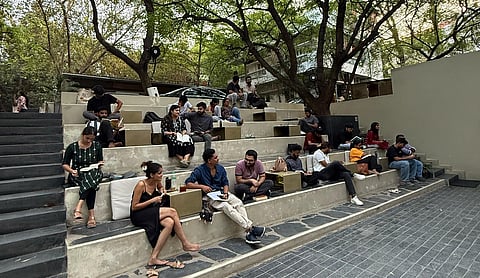Healing between the lines through bibliotherapy
In a sunlit café corner in Hyderabad, a group of strangers sit silently on a Sunday afternoon, each nose-deep in a book. There’s no pressure to perform, no introductions required. Just the gentle comfort of turning pages. This is @hyderabadreads, an Instagram reading community that meets offline every weekend. For them, and for many others, books are more than just stories. They are anchors to clarity, comfort, and healing. And now, they’re not just being read; they’re being prescribed.
Bibliotherapy, a therapeutic practice that uses reading as a tool for emotional processing, is not new. But its rise in mainstream therapeutic spaces in India, particularly among younger adults, points to a collective yearning to slow down and self-reflect. On World Book Day, experts delve into this unique form of therapy.
Manasi Udgirkar, a psychotherapist at Pause for Perspective, defines bibliotherapy as a very abstract way of allowing a book to be a container for reflection, emotional exploration, and self-discovery. “We even use picture books with adults. It’s not just about the words; it is the flow, the images, the way a book holds space for reflection,” she says, recounting how stories like Ish by Peter H Reynolds gently dismantle ideas of perfection. “I’ll tell clients, do this ‘ishly’. It’s not about doing it right; it’s about doing it your way,” she adds. This interpretive, process-driven approach gives bibliotherapy a curious advantage: it meets you exactly where you are, without judgement or prescription. “Just notice your sensations, memories, and emotions. There’s no right or wrong way to feel a story,” Manasi tells them.
While therapy sessions offer guided introspection, public reading spaces like @hyderabadreads create something gentler, a casual, collective kind of healing. “There’s something magical when someone opens up emotionally just by seeing a book you’re holding,” says Biswarupa Barik, one of the community’s organisers. She shared how books have sparked surprising connections. “Someone once saw me holding a book I hadn’t read in years,” she recalls, adding, “She told me it had helped her through a really hard time. We were strangers, but at that moment, we weren’t.”
This form of ‘social bibliotherapy’ isn’t structured, but it’s shown to be powerful in this hustling world. People who once considered reading a solitary activity now gather in groups, forming friendships and even parenting side-by-side as their kids quietly flip through pages.
Sree Kumar Palakkal is the founder of The Critical Dialogue, a Hyderabad-based organisation specialising in bibliotherapy. He combines bibliotherapy with what he calls a dialogic process, inspired by physicist David Bohm. “We don’t approach bibliotherapy with authority,” he says, noting, “It’s an invitation. A book can offer metaphors and language for what clients struggle to articulate. It does not attempt to impose or persuade but provides a safe space for you to find your way all by yourself.” He adds that even a short story, or a single page, can sometimes unlock something profound. “Sometimes that’s all it takes to spark meaningful transformation,” he notes.
For Sree Kumar, a session might begin with first having deep conversations with clients to understand what challenges they want to resolve, after which he carefully curates chosen books to help them cope. He quotes George Gurdjieff, saying, “Read not to remember, but to awaken.”
There’s something intimate about a story that holds your secret before you even speak it. Whether it’s a therapy room, a park bench, or a book club meet, bibliotherapy is about being read by what you read.
As digital culture makes attention spans scatter, bibliotherapy slows things down. If a children’s book helps a grown adult cry for the first time in weeks, who’s to say that’s not valid? Perhaps, this World Book Day, we can look at reading not as a chore or checklist, but as a small act of self-care. Whether it’s a poem scribbled in the margin of a journal or a copy of The Alchemist, books remind us of one thing again and again — you’re not alone.
PROFESSIONALS’ PICKS
Books that heal, according to the therapists:
● Ish by Peter H Reynolds - ‘A reminder that there’s beauty in imperfection.’
● Weirdo by Zadie Smith (illustrated) - ‘Gentle stories that help normalise being different.’
● Life Lessons by Elisabeth Kübler-Ross - ‘Wisdom for anyone navigating loss or change.’
● When Things Fall Apart by Pema Chödrön - ‘For when you need to begin again.’

